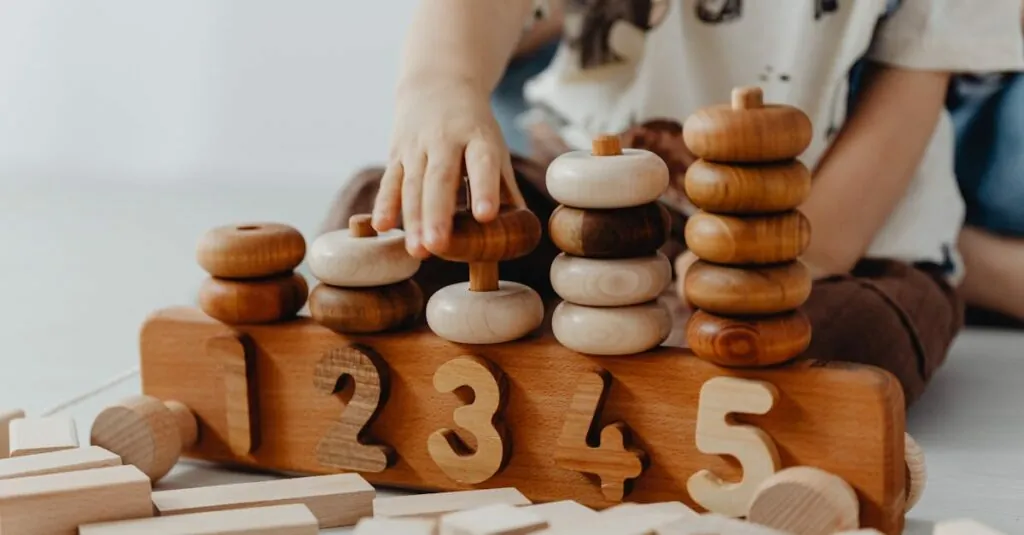Table of Contents
ToggleIn a world where toddlers can turn a living room into a tornado zone in seconds, the Montessori approach offers a refreshing twist. Imagine a method that not only encourages independence but also keeps the chaos at bay. Montessori toddlers thrive in environments designed for exploration and creativity, making them the pint-sized pioneers of their own learning journeys.
These little ones aren’t just stacking blocks; they’re mastering problem-solving and critical thinking while having a blast. With hands-on activities that spark curiosity, Montessori toddlers learn at their own pace, turning everyday moments into valuable lessons. So, if you’re ready to swap the usual toddler tantrums for a delightful dance of discovery, dive into the world of Montessori. It’s not just a method; it’s a lifestyle that might just make parenting feel a little less like herding cats.
What Is The Montessori Toddler?
The Montessori toddler embodies the principles of the Montessori educational approach, focusing on fostering independence in young children. In this environment, toddlers engage in activities tailored to their developmental stages. Designed to support their growth, these activities encourage exploration and help build essential life skills.
Toddlers thrive in settings that prioritize hands-on learning. They investigate their surroundings, manipulate objects, and take the initiative in their learning. Opportunities abound for social interaction, allowing them to develop communication skills and cooperation.
Education in a Montessori context respects the child’s natural learning pace. Rather than following a rigid curriculum, the focus centers on individual interests and abilities. Each child has the freedom to choose tasks that resonate with them, fostering intrinsic motivation.
A key element of the Montessori approach involves creating a prepared environment. Spaces are designed to be inviting and accessible, promoting a sense of order. Materials are age-appropriate and encourage independent work, enabling toddlers to explore various concepts at their own pace.
Parents play a crucial role within this framework by supporting their child’s autonomy. Encouraging self-care, such as dressing and feeding themselves, builds confidence. Observing children as they engage, parents can identify interests and support development effectively.
Understanding the Montessori toddler’s unique characteristics helps to cultivate an enriching environment. Awareness of their needs fosters a nurturing atmosphere that promotes growth. By adopting these principles, parents can create a joyful learning journey at home.
Key Principles Of Montessori Education
Montessori education revolves around key principles that shape a child’s learning experience. Respect for the child and the prepared environment stand out as foundational elements.
Respect For The Child
Respecting the child forms the cornerstone of Montessori education. Each child’s unique personality and individual learning style receive acknowledgment. Teachers and parents view children as capable individuals, encouraging them to explore and learn at their own pace. In doing so, they cultivate independence and foster self-confidence. Observing a child’s interests leads to tailored educational experiences. Empowering toddlers in their choices nurtures intrinsic motivation and enhances their engagement in learning activities.
The Prepared Environment
A prepared environment is essential for effective Montessori education. This space is thoughtfully organized to inspire exploration and learning. Age-appropriate materials are accessible, promoting independence and decision-making. Organized areas encourage children to engage in meaningful activities without unnecessary distractions. Careful arrangement promotes order, allowing toddlers to take responsibility for their surroundings. Flexibility in the environment respects each child’s need for autonomy while nurturing their natural curiosity. Environments designed with intention support hands-on learning and collaboration among peers.
Benefits Of The Montessori Approach For Toddlers
The Montessori approach offers numerous benefits for toddlers, supporting their development and learning journey effectively.
Fostering Independence
Independence emerges as a core benefit of the Montessori method. Toddlers choose their activities, nurturing self-direction and autonomy. These choices build confidence as they complete tasks at their own pace. Parents witness their children developing essential life skills through engaging in self-care and small household tasks. Montessori environments encourage toddlers to explore safely, promoting a sense of ownership over their learning experiences. This practice helps children develop critical decision-making skills early on.
Enhancing Cognitive Development
Cognitive development thrives within the Montessori framework. Hands-on, sensory-rich activities stimulate curiosity and critical thinking. Engagement with various learning materials allows toddlers to explore concepts, enhancing problem-solving abilities. As they interact with peers, social cognition also develops through collaboration and communication. The prepared environment fosters an atmosphere where toddlers can freely experiment, reinforcing their understanding of the world around them. This method emphasizes learning through discovery, catering to each child’s unique interests and developmental stages.
Activities For The Montessori Toddler
Montessori toddlers engage in various activities that support their development. These activities focus on fostering independence and enhancing sensory experiences.
Practical Life Skills
Practical life skills form a crucial part of Montessori activities. They help toddlers develop coordination, concentration, and confidence. Pouring, spooning, and sorting materials cultivate fine motor skills. Creating a simple snack or cleaning a small section of the house promotes self-sufficiency. Dressing and undressing dolls also teaches responsibility and care for belongings. Each activity empowers toddlers to take on daily tasks with ease. Moreover, incorporating these tasks into routines builds a strong foundation for future learning and life skills.
Sensorial Activities
Sensorial activities play a vital role in Montessori education. They enhance toddlers’ sensory experiences by inviting exploration through sight, sound, touch, taste, and smell. Using materials like textured blocks, sound boxes, and scented jars helps refine their senses. Matching colors and shapes further develops cognitive skills and concentration. Activities like sandpaper letters combine tactile and visual learning for early literacy. Each sensorial experience encourages toddlers to observe and interact with their environment. Notably, these activities also promote critical thinking and creativity in problem-solving.
Common Misconceptions About Montessori
Montessori education doesn’t mean a lack of structure. Instead, it emphasizes a carefully prepared environment that fosters independence while providing guidelines that encourage exploration. Many people believe that Montessori classrooms lack rules, but they actually cultivate a framework of respect and order.
Some often think that Montessori is only for gifted children. In fact, this method benefits all children by respecting their individual learning paces, allowing each child to thrive according to their unique capabilities. Another misconception is that Montessori toddlers are left to learn everything on their own. They benefit from adult guidance while being encouraged to explore and engage with their surroundings, which supports growth and development.
It’s common for individuals to believe that Montessori education limits social interaction. This approach fosters collaboration among children, promoting peer learning and relationship-building. Critics sometimes argue that the materials used in Montessori classrooms are overly simplistic. On the contrary, these materials are specifically designed to enhance sensory experience and critical thinking, making learning engaging and effective.
Some people assume that Montessori requires a rigid adherence to specific activities. In reality, flexibility exists, allowing children to choose materials and activities that resonate with them. Another misconception involves parents feeling they must inherit a strict Montessori lifestyle. Parents can integrate Montessori principles into home life without needing to fully commit to formal education.
Lastly, there’s a belief that Montessori education is expensive and exclusive. Numerous resources and communities offer accessible Montessori opportunities, ensuring that all families can explore this enriching educational approach. Understanding these misconceptions paves the way for a broader acceptance of Montessori principles in daily life, fostering a nurturing environment for children’s growth.
Embracing the Montessori approach for toddlers offers a transformative experience for both children and parents. By fostering independence and creativity within a carefully prepared environment, toddlers thrive as they explore and learn at their own pace. This method not only cultivates essential life skills but also nurtures a love for learning that lasts a lifetime.
Parents play a crucial role in this journey by supporting their child’s autonomy and encouraging meaningful interactions. As they observe and engage with their child’s interests, they create a nurturing atmosphere that promotes growth and discovery. Ultimately, the Montessori philosophy empowers families to enjoy a fulfilling and joyful parenting experience while setting the stage for lifelong learning.








